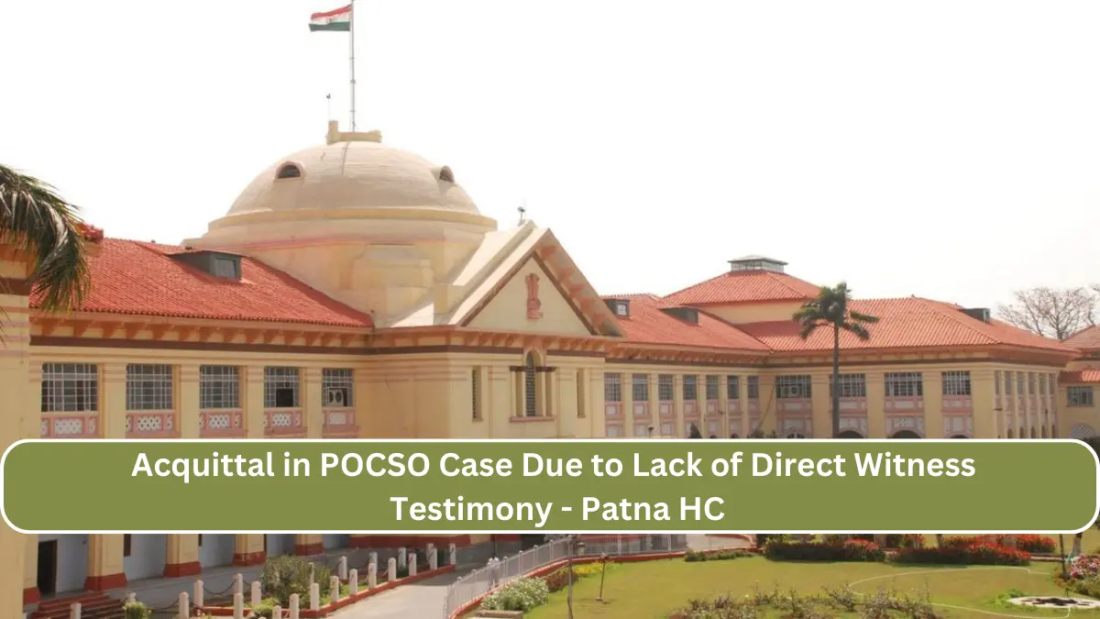Introduction:
The Patna High Court in X vs State of Bihar (Criminal Appeal No.- (DB) 229 of 2023) has overturned a judgment of conviction and order of sentence under the Protection of Children from Sexual Offences Act (POCSO), emphasizing the need for a clear and unerring chain of circumstances pointing unequivocally to the guilt of the accused.
Facts of the Case:
The Appellant was convicted for the rape and murder of the informant’s daughter under Sections 376(D), 302 of the Indian Penal Code, and Section 4, 6 of the POCSO Act. The prosecution alleged that the victim, a 12-year-old, was found dead with signs of sexual assault and strangulation after she went outside for personal needs.
Contention of the Petitioner:
The prosecution presented circumstantial evidence but lacked direct witness accounts of the alleged incident. The case primarily relied on the testimony of witnesses to establish the sequence of events leading to the victim’s death.
Response of the Appellant:
The prosecution’s case aimed to establish guilt through circumstantial evidence and witness testimony. However, some witnesses were declared hostile due to inconsistencies in their statements.
Court’s Observation:
The Court scrutinized the evidence presented, highlighting the lack of direct witness testimony and inconsistencies in the statements of key witnesses. Despite initial versions aligning with the prosecution’s narrative, subsequent statements failed to provide concrete evidence linking the appellant to the crime. The Court criticized the Investigating Officer for insufficiently verifying the victim’s age and highlighted discrepancies in the evidence provided under statutory provisions.
The Court observed that “From the aforesaid narration of initial version, it is clear that no one is eyewitness of the alleged occurrence. But when we scrutinize the evidence of PW-1 and PW-5, we find that PWs 1 and 5 have improved their case in order to make their depositions fit in the scheme of the prosecution version put forth 21 before the trial. They have already stated that both are not eyewitness of the alleged occurrence and they have also not seen anyone going towards the victim.” Further, “The postmortem report indicates incident of sexual assault on the victim before she died of asphyxia, as a result of throttling though which is quite in consonance with the initial version of prosecution story. The FSL report does not show any connectivity of the appellant with the victim.”
The Court was of firm opinion that “Judge should step into shoes of a prudent man. A common man would have many suppositions for the cause of occurrence in a case which is based on circumstantial evidence. There are several circumstances which are placed before the court, but it is only based on supposition. Then the court evaluate each supposition when the court have ruled out the suppositions, it is only such suppositions which has the highest probability, should be relied upon and taken as a proved. That is how the fundamental principle in respect of circumstantial evidence evolves”.
Court’s Decision:
After evaluating both direct and circumstantial evidence, the Court concluded that the prosecution had failed to prove the case beyond a reasonable doubt. It found that neither direct nor circumstantial evidence adequately supported the prosecution’s narrative. The Court emphasized the need for a clear guideline in assessing evidence and ruled that the Trial court had failed to prove the evidence in the correct perspective. Consequently, the Patna High Court set aside the judgment of conviction and order of sentence, acquitting the appellant of all charges.
-By Adv Deeksha Rai
 Cart is empty
Cart is empty 

